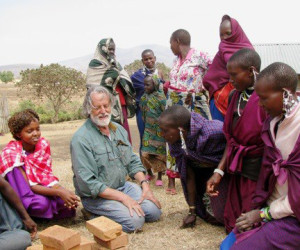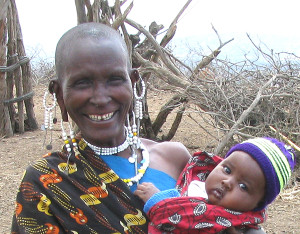Stoves and the Maasai economy
As unique as the Maasai may seem to be in their dress and practices, they are very connected to the larger world around them. Their culture, like all cultures, is dynamic and subject to change.
 We see more farm machines where there is land and sufficient rain for larger plots. Businesses spring up for cell phone charging, kerosene supply, and dispensing food and drink. There are motorcycle transport services available for a hire even in remote villages.
We see more farm machines where there is land and sufficient rain for larger plots. Businesses spring up for cell phone charging, kerosene supply, and dispensing food and drink. There are motorcycle transport services available for a hire even in remote villages.
However, improvements to home conditions have been left behind, and our stoves and solar systems are bringing them up along with the rest of the social structures. Men do not spend much time in any one of the homes of their wives, so the quality of the living space had not been a concern for them until recently.
As long as women did not know that their living space could be so much more healthy and pleasant, the pressure to bring these changes about did not exist. Now that it is known, the home has a new role in the economy.
Wealth in the Maasai economy
Wealth for the men in the Maasai culture is measured in terms of possession of cows, goats, wives, and bomas, or settlements where their wives and children live.
As men live through the stages of their lives, they might accumulate a large number of wives and children and then discover they need help from their sons and sons-in-law to take care of everyone in their large family.
The men still control most of the disposable income in the Maasai communities, although small goat holdings and control of money from small farming plots are becoming more common for women.
As contact with urban life increases, there is more need for cash. Cell phones, motorcycles, radios, and televisions are becoming part of the Maasai environment. Cows and goats become more “liquid” in such an environment, and less of a resource to hold.
How the Maasai pay for stoves and solar systems
Our work with the Maasai is primarily concerned with the appropriateness and high quality of what we provide. At the time we initiated the Project, the smoke situation in the Maasai home was so dangerous that we knew we could not risk introducing a stove that would not be successful in solving the challenge.
- Therefore the costs of the Project solutions are determined by the need for function and not the need for maximizing profits
This means that our organization has to provide the difference between what Maasai can pay for the products and the actual product costs, which are not fixed.
As value is perceived, willingness to pay changes. So it is part of our task to prove to a wider and wider audience that the stoves enable profound improvements. We are not selling a commodity. We are providing a chance to change to a much better life.
Our Project is very welcome in the culture. It puts women and children first, not the usual practice in this culture, and therefore represents unprecedented change.
There is universal learning going on worldwide about more equality for women and more attention to women’s needs and interest. Our Project is proud to be a part of that.
And as appreciation for the important and positive impact of our work grows, in this context of human development and human rights, the willingness to pay will increase.
Local solutions stimulate the economy
Sourcing locally whenever possible is integral to our philosophy. It reduces our footprint while strengthening the economy of those who need it the most. Our manufacturing plant is right in the area. As we grow, we will continue to keep production in the same vicinity as installation sites, providing jobs while minimizing transportation costs.
A sample of labor and goods purchased on an ongoing basis
Bricks
A stove requires about 120 bricks, and we can purchase them at the rate of 16 to the dollar.
Tools
Our installation teams need saws, spirit levels, pliers, trowels, shovels, pails, and ladders. Ladders are homemade, but we buy the rest at local hardware stores. Prices are slightly lower than in the U.S. Tool quality is often low and they have to be replaced often.
Sheet metal
Steel sheets, just under 2 mm think cost approximately $14 for the steel needed in one stove fire box.
Motorcycle
A new Japanese motorcycle costs $1600 in Tanzania.


 International Collaborative for Science, Education, and the Environment
International Collaborative for Science, Education, and the Environment